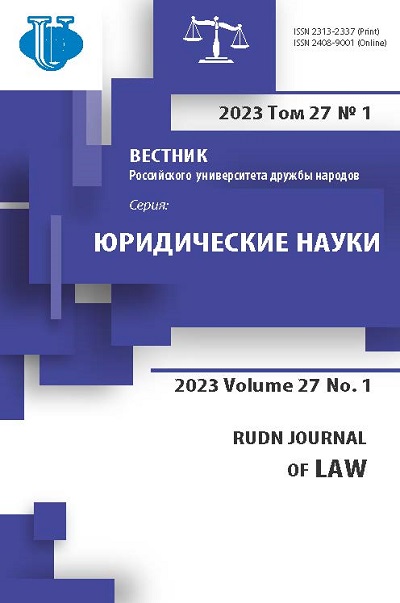Constitutional foundations of cross-border digital healthcare
- Authors: Akimtseva Y.V.1
-
Affiliations:
- Peoples’ Friendship University of Russia
- Issue: Vol 27, No 1 (2023)
- Pages: 76-96
- Section: CONSTITUTIONAL AND MUNICIPAL LAW
- URL: https://journals.rudn.ru/law/article/view/34058
- DOI: https://doi.org/10.22363/2313-2337-2023-27-1-76-96
- ID: 34058
Cite item
Full Text
Abstract
The purpose of the research is to look at the issues of legal regulation of information healthcare, consider the positive experience of international legal regulation to overcome legal gaps in digital healthcare, improve the quality of life of the population and the systemic functioning of information biomedicine based on the principles of mutually beneficial cooperation between Russia and foreign countries. It examines the historical aspects and modern trends of cross-border digital healthcare in accordance with international standards, positive and negative consequences of the information biomedicine impact on basic constitutional human rights and freedoms. The research analyzes national and international legislation, the main directions of constitutional regulation of digital biomedicine and proposes to create an effective mechanism for implementing national legislation on digital healthcare, based on the positive experience of international legal regulation and protection of basic constitutional human rights in order to prevent the use of ethically unacceptable methods. The following scientific methods have been applied in the research: theoretical, historical, empirical, classification and comparative legal analysis. The study identified the urgent need for holistic approach to transnational digital healthcare, characterized by integration of law and biomedicine, and constitutional regulation of the biomedical research approbation. It is worth mentioning that the practical research activities of medical professionals and lawyers are interrelated and require constant interaction and analysis of biomedical results and their legal justification. Therefore, the function of law is to regulate the limits of human intervention in information biotechnologies, identify and exclude all possible risks of approbation of scientific research and their results in the sphere of digital healthcare. The author believes that development of information biomedicine involves interplay of various spheres of knowledge based on scientific synergy of medical, legal, and ethical aspects, integration of interrelated legal and non-legal sciences. Given the importance of integrating the constitutional foundations of cross-border digital healthcare, the author proposes to create a single extraterritorial Concept of Transnational eHealth. It is essential to consider international experience in order to ensure proper protection of human rights in the sphere of information healthcare.
About the authors
Yanina V. Akimtseva
Peoples’ Friendship University of Russia
Author for correspondence.
Email: akimceva@list.ru
ORCID iD: 0009-0000-3354-4889
Postgraduate student of the Department of Constitutional Law and Constitutional Proceedings, Law Institute
6 Miklukho-Maklaya str., Moscow, 117198, Russian FederationReferences
- Andreeva, L.A. (ed.). (2013) The right to life, health and property: a collective monograph. Novosibirsk, SibAK Publ. (in Russian).
- Alemzadeh, H., Iyer, R.K., Kalbarczyk, Z., Leveson, N. & Raman, J. (2016) Adverse Events in Robotic Surgery: A Retrospective Study of 14 Years of FDA Data. PLoS One. 11 (4), 1-20. http://dx.doi.org/10.1371/journal.pone.0151470
- Blokhin, P.D. (2020) Five theses on the role of the practice of the Constitutional Court of the Russian Federation in the system of legal regulation of healthcare. Medical law. (1), 18-27. (in Russian).
- Cho, Y., Jeong, M. & Park, S. (2016) The effect of the Korean robot act on the Korean robotics industry and its implications. KIET Industrial Economic Review. 21(6), 27-41.
- Gadzhiev, G.A. & Voinikanis, E.A. (2018) Could robot be a legal subject? (In search of legal forms for digital economy regulation). Law. Journal of the Higher School of Economics. (4), 24-48. https://doi.org/10.17323/2072-8166.2018.4.24.48 (in Russian).
- Inyushkin, A.N., Inyushkin, A.A. & Malyshev, K.V. (2021) Law and bioethics of innovative medical technologies: monograph. Moscow, Prospect Publ. (in Russian).
- Khabrieva, T.Ya. (2018) Law facing the challenges of digital reality. Journal of Russian law. 9 (261), 5-16. https://doi.org/10.12737/art_2018_9_1 (in Russian).
- Khabrieva, T.Ya. (2019) Projections of the development of convergent technologies in law. In: Savenkov A.N. (ed.). Transformation of the paradigm of law in the civilizational development of mankind: reports of members of the Russian Academy of Sciences. Moscow, IGP RAN Publ. pp. 138-152. (in Russian).
- Klishas, A.A. & Eremyan, V.V. (2015) Constitutional control and constitutional justice of foreign countries. Comparative legal research. Moscow, International Relations Publ. (in Russian).
- Kozlov, V.D. & Girina, T.S. (2020) Legal regulation of information at the constitutional level in Russia. Jurist. (2), 51-54. https://doi.org/10.18572/1812-3929-2020-2-51-54 (in Russian).
- Fedotovskikh, A.V. (ed.). (2018) The use of artificial intelligence systems in the conditions of a new stage in the development of the Arctic. Analytical review. Moscow, Pervyi tom Publ. (in Russian).
- Romanovskiy, G.B. (2010) The concept and content of reproductive rights in Russia and the CIS countries. Reformy i pravo. (4), 3-18. (in Russian).
- Romanovsky, G.B., Tarusina & N.N., Mokhov, A.A. et al. (2015) Biomedical law in Russia and abroad: monograph. Moscow, Prospect Publ. (in Russian).
- Salnikov, V.P. (2003) Biomedical technologies and law in the third millennium. Saint Petersburg, Saint Petersburg University of the Ministry of Internal Affairs of Russia. (in Russian).
- Shablova, E.G., Zhevnyak, O.V. & Li, Chan (2018) Legal regulation of rendering medical services (a study of the Russian Federation and the People’s Republic of China). The Review of Economy, the Law and Sociology. (4), 186-191. (in Russian).
- Stolyar, V.L., Amcheslavskaya, M.A. & Fedorov, V.F. (2020) Telemedicine: tasks, technologies, prospects: textbook. Moscow, RUDN Publ. (in Russian).
- Tikhomirov, Yu.A. & Nanba, S.B. (eds.). (2019) The legal concept of robotization: monograph. Moscow, Prospect Publ. (in Russian).
- Vladzimirsky, A.V. (2016) Telemedicine: Curatio Sine Tempore et Distantia. Moscow, Aegitas Publ. (in Russian).
Supplementary files















